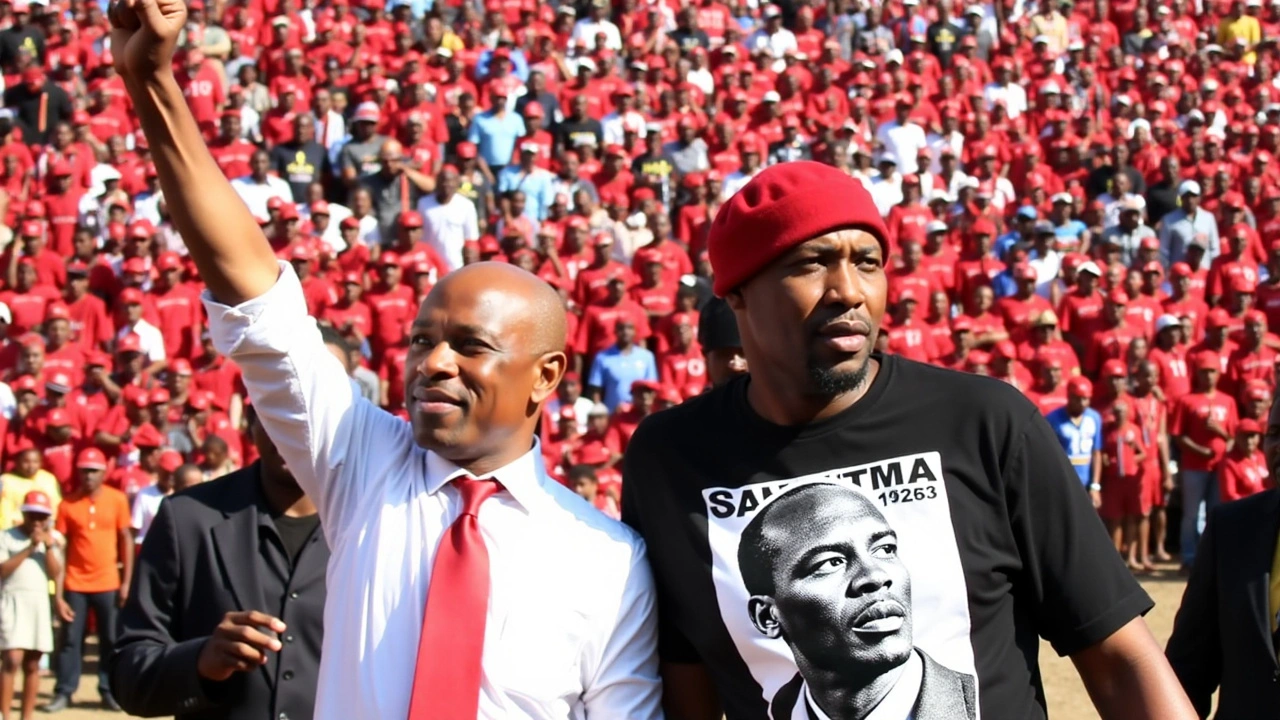Floyd Shivambu Steps Down After Tense Rift with Julius Malema
The resignation of Floyd Shivambu from the Economic Freedom Fighters (EFF) has sent shockwaves through the South African political landscape. An inside source has revealed that this sudden departure was precipitated by a severe fallout with the party's leader, Julius Malema. Shivambu, who has been the EFF's Deputy President since its inception in 2013, found himself at odds with Malema after it was uncovered that he planned to challenge Malema for the presidency of the party.
A Long-Standing Alliance Fractures
Shivambu and Malema have been the faces of the EFF since its earliest days, steering the party through numerous political storms and internal upheavals. Their partnership symbolized a strong, unified front pushing for economic justice and more significant political representation for the underprivileged sectors of South African society. However, the discovery of Shivambu's ambitions to take the helm appears to have shattered this once-solid alliance, leading to a pivotal and painful separation.
An Inevitable Breakup
The news of Shivambu's resignation has been described by Malema himself as 'painful,' comparing it to the loss of his mother. Malema has officially accepted the resignation, acknowledging that it represents a substantial blow to the EFF. The internal disagreements and dissent seem to have been festering for some time, only now rising to the surface in a way that demanded immediate and drastic action.
A New Home in the uMkhonto Wesizwe Party
Following his resignation, Floyd Shivambu will be joining the ranks of the uMkhonto Wesizwe (MK) party. Led by former President Jacob Zuma, the MK Party has made significant strides in recent months, even surpassing the EFF to become the third-largest political party in South Africa. Shivambu's transition to the MK Party is not seen in isolation; several other notable EFF members, including MP Jimmy Manyi, have declared their intentions to follow him.
The Ramifications for EFF
The EFF's loss of Depute President Floyd Shivambu is a critical development at a crucial time. The party has been grappling with internal challenges and leadership struggles, and this latest news only adds to its uphill battle. Julius Malema has reiterated that the party's doors remain open for Shivambu, a statement that reflects the gravity of the loss. However, with new leadership elections set for December and the party having recently been unseated as the official opposition in the National Assembly by the MK Party, the future seems uncertain and fraught with challenges. Malema has confirmed he will be running for re-election, hoping to steer the party through this tumultuous period.
Internal Strife and the EFF's Future
Insiders within the EFF have highlighted the friction between Malema and Shivambu, describing it as a pivotal moment in the party's history. Shivambu's resignation may mark the beginning of a new chapter for the EFF, but it also flags significant issues that the party needs to address. The EFF has to maneuver through this period carefully, balancing internal reforms with the pressing need to retain its political influence and relevance. The departure of such a high-profile figure is both a wake-up call and an opportunity for renewal.
Plans for the Future
In a recent press briefing, Julius Malema assured supporters and detractors alike that the EFF would continue its mission undeterred. The party plans to address the internal issues head-on, with a focus on solidarity and strategic planning. The upcoming leadership elections in December will be a critical juncture for the EFF, determining whether it can rebound from these recent setbacks or if it will continue to be overshadowed by the ascendancy of the MK Party.

Looking Ahead
Shivambu's new alliance with the MK Party could have far-reaching political implications. As he joins forces with former President Jacob Zuma, it will be intriguing to see what new political strategies emerge and how they could impact South Africa's political landscape. For the EFF, this development demands introspection and adaptation. How Malema and the remaining leadership respond to these challenges will be crucial in redefining the party's identity and future trajectory.
Conclusion
Floyd Shivambu's resignation symbolizes more than just a personal or political fallout; it represents a turning point for the EFF and its supporters. The exit of a co-founder and longstanding deputy president has left an undeniable void, but it also opens the door for transformation and renewal. As the EFF prepares for its upcoming leadership elections and grapples with internal challenges, the political landscape in South Africa remains as dynamic and unpredictable as ever.

14 Responses
Man, the Shivambu fallout feels like a blockbuster drama that just flipped the script on the EFF. The whole thing was simmering under the surface, and now it’s exploded into this headline‑making resignation. It's wild how personal ambition can reshape a party’s whole vibe. Guess we'll see how Malema recalibrates his playbook.
Totally agree, the split is a seismic shift for the EFF, but it also opens a window for fresh leadership. Malema’s next moves will need to balance loyalty with a clear vision, otherwise the party risks further splintering. It’s crucial he sets firm boundaries while still rallying the base.
The resignation of Floyd Shivambu represents not merely a personnel change but a tectonic reconfiguration of the EFF's ideological architecture.
From a strategic management perspective, the abrupt departure signals a breakdown in the internal governance matrix that had, for a decade, sustained the party's operational momentum.
Stakeholders now confront a classic case of principal‑agent discord, where the deputy’s aspirational calculus collided with the leader’s charismatic authority.
The power vacuum creates an environment ripe for emergent coalition dynamics, especially as the MK Party capitalizes on this turbulence.
Political theorists will likely cite this as a textbook illustration of factional realignment within a populist movement.
Moreover, the narrative arc mirrors the classic hero‑villain dichotomy, with Malema cast as the steadfast protagonist defending the party’s core.
The media framing of this saga has already adopted a sensationalist lexicon, referring to it as a ‘political earthquake’ that reverberates across the nation.
Analysts predict that donor confidence may wobble, prompting a recalibration of campaign finance strategies ahead of the December congress.
Constituents who identified with Shivambu’s rhetoric must now reconcile their expectations with the evolving platform under Malema’s sole helm.
The internal policy committees are expected to undergo rapid restructuring to address the void left in economic justice initiatives.
In the realm of public perception, the party’s brand equity faces a critical test: can it retain its rebellious image while appearing institutionally stable?
Strategic communicators should consider deploying targeted messaging that emphasizes continuity of purpose despite leadership turnover.
Simultaneously, the MK Party’s recruitment of former EFF heavyweights underscores a broader realignment of left‑wing forces in South Africa.
This competitive landscape will likely intensify policy debates on land reform, nationalization, and youth employment.
Ultimately, the EFF’s resilience will be measured by its ability to transform this crisis into a catalyst for renewal, rather than succumbing to fragmentation.
Shivambu’s betrayal is a glaring example of personal greed eclipsing collective struggle.
And that kind of treason, folks, is exactly what the deep‑state feared-an internal coup that could destabilize the entire left front!
What does this schism tell us about the nature of power within movements that claim to dismantle hierarchy? Is the quest for authority inevitable, or can genuine collective leadership survive such temptations?
I appreciate the nuanced perspectives presented herein and wish to extend my heartfelt empathy to all members navigating this period of uncertainty; the path ahead undoubtedly demands both reflection and solidarity.
From a structural standpoint, the EFF must now reassess its succession protocols to prevent similar disruptions in the future.
While the call for procedural overhaul appears commendable on the surface, the reality is far more intricate; one must dissect the existing bylaws, evaluate the efficacy of current checks and balances, and then propose a comprehensive amendment package that does not merely patch symptomatic issues but addresses the root causes of internal dissent.
Such a meticulous approach will safeguard the party’s doctrinal purity while fostering a transparent governance framework.
Shivambu’s exit is a bold move, but it could spell trouble for his political future.
The shifting alliances remind us that political landscapes are never static; each move reshapes the narrative and tests the resilience of our democratic ideals.
It is evident that this development necessitates a strategic reassessment of the EFF’s long‑term objectives and an earnest engagement with its grassroots constituencies.
Indeed, a rigorous analytical framework must be employed to gauge the impact of such leadership transitions, thereby ensuring that policy formulation remains both coherent and empirically grounded.
One might wryly observe that the party’s internal drama now mirrors a Shakespearean tragedy, albeit with considerably fewer soliloquies and a surplus of political grandstanding.